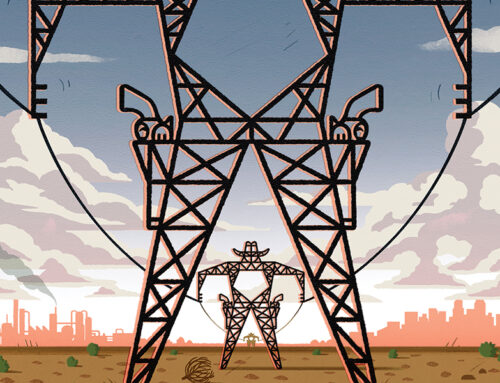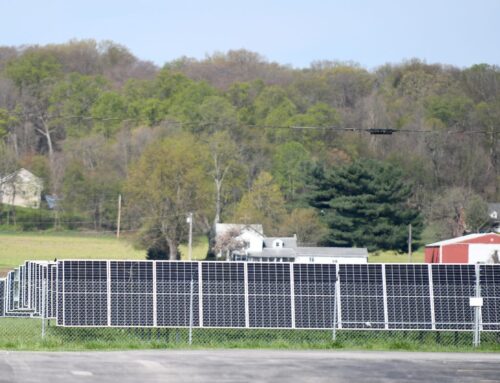Trump froze Biden’s marquee climate accomplishment and it’s roiling the renewable energy world
February 9, 2025
Trump froze Biden’s marquee climate accomplishment and it’s roiling the renewable energy world
Catherine Boudreau/Business Insider
- A federal pause on climate funding is delaying renewable energy projects and hiring.
- Recipients of grants, loans, and tax credits said they don’t know if they’ll be paid.
- The uncertainty is roiling solar, electric vehicle, and energy efficiency companies.
States and businesses deploying renewable energy projects are scrambling to raise capital, delaying hiring, and, in some cases, furloughing staff.
That’s because the funds they were awarded months ago aren’t available as President Donald Trump races to squash his predecessor’s marquee climate law.
Maren Mahoney, director of Arizona’s Office of Resiliency, was preparing to hire four employees to help manage a $156 million grant awarded under the Inflation Reduction Act to fund rooftop solar in low- to moderate-income communities across the state. The project could benefit an estimated 11,200 households by providing cheaper energy, she said. But as of February 7, a federal payment system was inaccessible.
“We are really hesitant to go ahead and hire anybody because we’re unable to get into the system, which is how we eventually get reimbursed for our payroll expenses,” Mahoney said. “These projects are about affordability and adding energy capacity to the system. So I think solar is actually in line with some of President Trump’s priorities.”
State officials, solar and electric vehicle businesses, and government workers told Business Insider that their funding remains frozen following Trump’s executive order pausing hundreds of billions of dollars in loans, grants, and tax credits for renewable energy projects under the IRA. And even though several federal judges have temporarily blocked a more sweeping spending pause, uncertainty persists among financial grantees.
Jillian Blanchard, vice president of climate change and environmental justice at Lawyers for Good Government, said her team has fielded more than 100 inquiries from groups awarded grants from the Environmental Protection Agency, the Energy Department, and the Agriculture Department.
“Many are waiting on legally obligated funds,” Blanchard said. “Some are being are waiting for invoices to be paid. Several have pulled back job offerings that are needed to meet the terms of their grants. Some are having to let people go, and some can’t make payroll.”
A spokesperson for the EPA said it couldn’t comment on the funding freeze, citing pending litigation, and that the agency is working to implement Trump’s executive orders. The Agriculture Department and Energy Department didn’t return requests for comment.
Furloughs and funding limbo
David Funk, president of Zero Emissions Northwest in Washington state, said on LinkedIn that he furloughed his staff due to Trump’s executive orders. The company helps secure grants for rural farmers and small businesses to save on their energy costs by installing solar panels and energy-efficient appliances, among other projects.
He said his clients have $1.9 million in projects under construction but over $250,000 in delayed reimbursements from the Agriculture Department’s Rural Energy for American Program, which is funded by the IRA.
“These farmers, laundromat owners, and rural grocery stores took on debt and dipped into their savings, trusting that the grants they were awarded would be paid,” Funk said. “Due to Trump’s recent executive order, we’ve advised all clients to pause all future investments as we no longer have confidence that signed contracts will be honored.”
EV charging startup SWTCH was awarded over $1 million in federal funding to deploy electric vehicle chargers at multifamily properties in Puerto Rico. Josh Cohen, SWTCH’s head of policy, told Business Insider last week that the company received an email from the Energy Department three days after Trump’s inauguration saying leadership had “placed a hold” on the project until further notice.
Uncertainty around the future of funding
Cohen said he expects the project to eventually move forward, but the White House orders are creating a lot of uncertainty for small businesses that need government reliability and predictability.
Democrats in Congress also lack clarity about the status of programs at the EPA— one of the main federal agencies implementing the IRA.
On February 6, Sen. Ed Markey, a Democrat from Massachusetts, and a handful of other lawmakers protested the spending freeze outside EPA headquarters but were blocked by security from entering the agency.
“We need evidence provided to us that the EPA is complying with the court orders,” Markey said.
They demanded a meeting with Administrator Lee Zeldin and any employees with Elon Musk’s Department of Government Efficiency, which has been fanning out across the federal government. Zeldin was in Los Angeles as part of the EPA’s response to the wildfires.
Since the IRA was enacted in 2022, companies have announced plans to invest more than $167 billion in factories to build and recycle technologies like solar panels and EV batteries, according to the research firm Atlas Public Policy. Many companies are awarded both federal tax credits and loans and grants.
“There’s nothing that hurts our economy more than uncertainty,” Bob Keefe, the executive director of E2, a business group that advocates for renewable energy policy, told Business Insider. “And right now, the uncertainty of tax credits and the spending freeze is roiling the economy. It’s not making it attractive for companies to invest and expand and hire new workers.”
Search
RECENT PRESS RELEASES
Related Post



